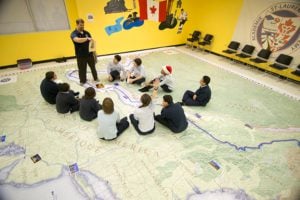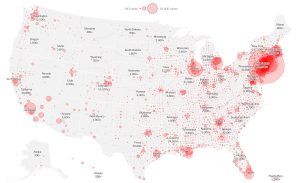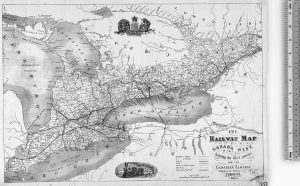
Kids
Giant floor maps put students on the map
Canadian Geographic Education’s series of giant floor maps gives students a colossal dose of cartography and is a powerful teaching tool
- 1487 words
- 6 minutes
This article is over 5 years old and may contain outdated information.
Mapping

There’s a cluster in Western Canada, in southern Ontario, and more recently in Quebec—and we’re not talking pine trees. Top notch athletes hail from all over the country, but why do some places seem to produce more Olympians than others?
Dale Henwood is president and CEO at the Canadian Sport Institute in Calgary. He says there are some main factors that contribute to excellence in an athlete which can sometimes translate to regional excellence. Among them is support, personal drive and access, but also a level of discomfort.
He says in some cases, privilege can work against motivation.
“In a Canadian context, we have affluence, and that’s sometime more difficult to work with in sports,” says Henwood. “Here we’re comfortable. I’ve been to places around the globe with world class facilities and no athletes in them, and other places with not-so-great facilities, but they’re in full use.”
While athletes from smaller towns are often seen as underdogs, Henwood thinks they may actually have an advantage. Less competition for practice time on the ice and more access to a coach might help explain why many world class athletes and Olympians emerge from small towns.
Zoom in and explore this interactive map of Canadian Olympians’ hometowns.
Are you passionate about Canadian geography?
You can support Canadian Geographic in 3 ways:

Kids
Canadian Geographic Education’s series of giant floor maps gives students a colossal dose of cartography and is a powerful teaching tool

Mapping
Maps have long played a critical role in video games, whether as the main user interface, a reference guide, or both. As games become more sophisticated, so too does the cartography that underpins them.

Mapping
Canadian Geographic cartographer Chris Brackley continues his exploration of how the world is charting the COVID-19 pandemic, this time looking at how artistic choices inform our reactions to different maps

Mapping
Early maps of the railways that shaped our country